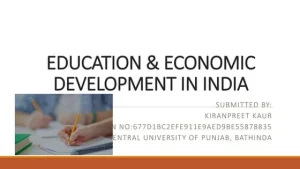Education is a fundamental pillar of economic development, influencing not only individual prosperity but also the collective growth of nations. As societies evolve, the importance of a well-educated workforce becomes increasingly apparent. This article explores the multifaceted role of education in economic development, highlighting its impact on productivity, innovation, and social equity.
1. Enhancing Human Capital
At the core of economic development lies human capital—the skills, knowledge, and competencies of the workforce. Education is crucial for enhancing human capital, equipping individuals with the skills necessary to thrive in the labor market.
Key Aspects:
- Skill Development: Education systems that emphasize critical thinking, problem-solving, and technical skills prepare individuals for various industries, leading to increased productivity.
- Lifelong Learning: Continuous education and training enable workers to adapt to changing job requirements, ensuring they remain competitive in a dynamic economy.
2. Driving Innovation and Entrepreneurship
Education fosters an environment conducive to innovation and entrepreneurship, both of which are vital for economic growth.
Innovation Cultivation:
- Research and Development: Higher education institutions often conduct research that leads to technological advancements and innovative solutions. This research contributes to economic growth by creating new industries and improving existing ones.
- Entrepreneurial Mindset: Educational programs that promote creativity and entrepreneurship encourage individuals to start their own businesses, driving job creation and economic diversification.
3. Improving Productivity and Economic Output
A well-educated workforce is more productive, which directly influences a nation’s economic output.
Productivity Metrics:
- Higher Wages: Education typically correlates with higher wages, as skilled workers contribute more value to their employers. Increased earnings lead to higher consumer spending, further stimulating economic growth.
- Efficiency Gains: Educated workers are often more efficient, leading to improved processes and reduced costs for businesses.
4. Promoting Social Equity and Inclusion
Education plays a critical role in promoting social equity, helping to bridge economic disparities within societies.
Equitable Access:
- Reducing Poverty: Access to quality education is one of the most effective ways to break the cycle of poverty. By providing individuals with the skills needed for better employment opportunities, education helps lift families out of poverty.
- Empowerment of Marginalized Groups: Education empowers women and marginalized communities, promoting gender equity and social inclusion. Educated individuals are more likely to participate in civic activities, contributing to stronger democratic processes.
5. Attracting Investment
Countries with strong educational systems are more attractive to both domestic and foreign investors.
Investment Appeal:
- Skilled Workforce: Investors seek locations with access to a skilled and educated workforce. A strong education system signals to companies that they will find capable employees.
- Stable Economic Environment: Nations that prioritize education often experience greater political stability and social cohesion, further enhancing their appeal to investors.
6. Building a Knowledge-Based Economy
In the 21st century, economies are increasingly reliant on knowledge and information. Education is a key driver in transitioning from traditional industries to knowledge-based economies.
Knowledge Economy Features:
- Focus on Research and Development: Countries that invest in education foster research and innovation, leading to advancements in sectors such as technology, healthcare, and renewable energy.
- Global Competitiveness: A well-educated population enhances a country’s competitiveness on a global scale, enabling it to participate effectively in international markets.
 Conclusion
Conclusion
The role of education in economic development is profound and multifaceted. By enhancing human capital, driving innovation, improving productivity, promoting social equity, attracting investment, and building knowledge-based economies, education serves as a catalyst for sustainable economic growth. As nations face the challenges of globalization and technological change, investing in education is not just beneficial; it is essential for ensuring a prosperous and equitable future. Prioritizing education can lead to transformative outcomes, empowering individuals and communities while fostering economic resilience and growth.


